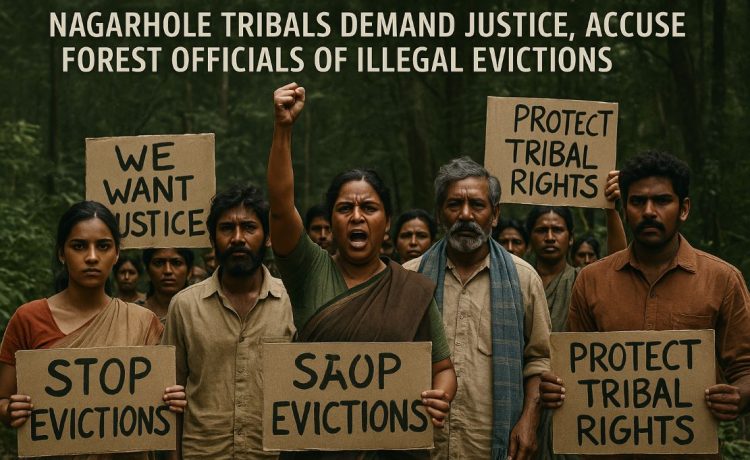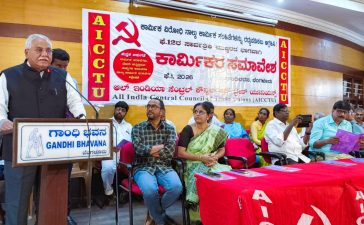Adivasi Communities Accuse Forest Officials of Rights Violations in Nagarhole: Call for Immediate Action and Recognition of Forest Rights
May 3, 2025 – Nagarhole, Karnataka — In a strongly worded press statement issued on Friday, the Nagarhole Adivasi Jamma Hakku Sthapana Samiti accused the Karnataka Forest Department of systematic violations of tribal rights, invoking both legal and constitutional concerns over the treatment of indigenous communities residing in and around the Nagarhole Tiger Reserve.
The Samiti, which represents tribal groups such as the Jenu Kuruba and Betta Kuruba communities, condemned what they called a “deliberate denial of forest rights” under the Forest Rights Act (FRA) of 2006 and warned of legal consequences if such actions persist.
Forest Guardians Under Siege
For generations, the indigenous communities have lived in harmony with the dense forests of Nagarhole. Far from being encroachers, they see themselves as custodians of the ecosystem.
“We are the forest, and the forest is us,” said T.M. J.K., President of the Nagarhole Adivasi Jamma Hakku Sthapana Samiti. “Yet the authorities treat us like outsiders.”
The press note alleges that while tribal families have consistently protected the forest, their basic rights are being trampled in the name of conservation and wildlife protection.
Forest Rights Act Ignored, Say Adivasis
The Forest Rights Act of 2006 guarantees both Individual Forest Rights (IFR) and Community Forest Rights (CFR) to traditional forest dwellers. However, villagers from Kolligadde Hadi, Kanthoru Hadi, Karadikal Hatti, and several other settlements claim their applications under the Act are pending due to deliberate delays and bureaucratic obstruction.
“Joint surveys and inspections by the Tribal Welfare Department, Revenue, and Panchayat officials were conducted months ago, yet the Forest Department refuses to forward or approve our claims,” said Ramya P.C., a member of the Samiti.
Officials Named in Alleged Violations
The press note specifically names retired Principal Chief Conservator of Forests B.K. Singh, accusing him of misusing his influence to oppose Adivasi forest rights under the pretext of conservation. The statement warns that such actions may constitute punishable offenses under the SC/ST (Prevention of Atrocities) Act, 1989.
“Whether retired or not, no officer has the right to interfere with the constitutional rights of Scheduled Tribes,” said Uday P.R., another member of the committee.
Demands and Call to Action
The Samiti has issued three key demands:
-
Rehabilitation with Dignity: All displaced or relocated tribal communities must be resettled at their original sites and granted forest rights as per the FRA.
-
End to Illegal Conservation Measures: Any policy or action that undermines the FRA in the name of forest or wildlife conservation should be halted immediately.
-
Ban on External Interference: Individuals like B.K. Singh must be restrained from influencing forest policy or implementation in a way that threatens Adivasi rights.
Shiva J.A., a youth leader from the region, stated, “Our people are tired of fighting year after year. We are not against conservation—we are against the idea that forests must be emptied of people in order to be saved.”
A Legal and Ethical Battle
Legal experts and rights activists have repeatedly noted that India’s conservation policies often clash with tribal rights, even though legislation like the FRA exists precisely to prevent such conflicts.
“The government cannot speak of forest protection without including the voices of those who have preserved them the longest,” said a local human rights advocate who requested anonymity.
With growing national and international scrutiny on the treatment of forest dwellers, the Nagarhole Adivasi Jamma Hakku Sthapana Samiti’s press statement is a sharp reminder that conservation without justice is not sustainable.
🔹 Subject Summary
Adivasi communities in Nagarhole, Karnataka, have accused forest officials of systematically violating their rights under the Forest Rights Act (FRA) 2006. The Nagarhole Adivasi Jamma Hakku Sthapana Samiti has issued a press note alleging illegal evictions, bureaucratic obstruction of legal claims, and targeted interference by senior forest officials. They demand the recognition of forest rights, rehabilitation of displaced families, and an end to anti-tribal conservation practices.
🔹 Context and Background
-
Communities Involved: Jenu Kuruba, Betta Kuruba, and other Adivasi groups.
-
Location: Nagarhole Tiger Reserve, Karnataka.
-
Key Law: The Forest Rights Act (2006), meant to secure land and livelihood rights of forest-dwelling communities.
-
Key Accusation: Violation of the FRA by the Karnataka Forest Department; named interference by retired PCCF B.K. Singh.
-
Wider Issue: Tension between conservation policies and tribal rights across India.
🔹 Key Statements & Quotes
“We are the forest, and the forest is us. But we are being treated as invaders in our own home.” — T.M. J.K., President, Adivasi Jamma Hakku Sthapana Samiti
“Our rights under the Forest Rights Act are not a request — they are the law. Ignoring them is a crime.” — Ramya P.C., Committee Member
“Bureaucrats and ex-officials like B.K. Singh cannot hijack forest governance to suit elitist conservation narratives.” — Uday P.R., Community Leader
“The forest flourished with us in it. It’s the state that’s threatening the ecosystem by uprooting its true protectors.” — Shiva J.A., Adivasi Youth Leader
🔹 Q & A Section
Q: What are the Adivasis in Nagarhole demanding?
A: They are demanding the recognition of their forest rights under FRA, rehabilitation of displaced families, and a stop to any external interference in forest governance.
Q: Who is being accused of interfering?
A: Retired PCCF B.K. Singh and the Karnataka Forest Department are being accused of obstructing tribal claims and violating constitutional rights.
Q: Why is this issue important?
A: It highlights the ongoing conflict between conservation policy and the rights of indigenous people — an issue central to India’s forest governance.
#ForestRights #AdivasiLivesMatter #FRA2006 #Nagarhole #TribalJustice #StopEvictions #GreenJustice #SCSTAct #ConservationWithJustice #IndigenousRights
![]()











